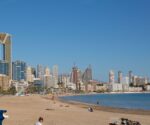Africa’s largest country with breathtaking beaches but no tourists: ‘No one comes here’ | World | News
A stunning North African country is hailed for its stunning coastline and beaches, but remains an “underrated” holiday destination.
Algeria boasts a rich mix of history, culture, and natural beauty, but despite its charms there is still a conspicuous lack of tourists there, according to reports.
Rob Crossan, a travel writer for The Times, wrote about his visit to the country in 2024, and observed that “tourists are scarce enough that your very presence turns heads; virtually nobody comes to Algeria”.
Crossan says it’s obvious why given lingering “security concerns and the ruling FLN government’s apparent disinterest in promoting tourism”, which mean “that precious few turn their compasses in its direction”.
The Foreign Commonwealth & Development Office (FCDO) currently advises against all travel to parts of the country.
This includes within 30km of Algeria’s borders with Libya, Mauritania, Mali, Niger and Tunisia – in the provinces of Illizi and Ouargla and in the Chaambi mountains area.
The UK Foreign Office also currently advises against all but essential travel to within 30km of the rest of Algeria’s border with Tunisia.
But despite the challenges Algeria faces, authorities are keen to lure more visitors to its scenic and cultural treasures, and are pushing efforts to improve hotels and restore its historical sites, Reuters reports.
Its capital city Algiers is known for its eclectic beauty, blending French colonial architecture and traditional Algerian culture.
Its Casbah, the citadel of Algiers, is a UNESCO World Heritage site famed for its winding streets, historic mosques, and grand Ottoman palaces.
Other highlights include the Notre Dame d’Afrique, a Catholic basilica, which offers panoramic views of the city and the Botanical Garden Hamma, which offers elegant French and English-style gardens with fountains, and even has a fine art museum and a small zoo.
Meanwhile, a port city in the northwest is known for its charm, rich folk music culture and Spanish colonial influence.
The country is bordered to the north and east by sky blue waters of the Mediterranean Sea, and has a 994-mile coastline “fringed with long sandy beaches”, according to travel website Lonely Planet.
Though it can get extremely hot in the summer (with the average maximum in July at around 45/46C), the more temperate highs of 25C it sees in December have led some to hail it as a great winter travel spot.
Australian and American authorities continue to warn travellers to exercise caution over the dangers of the risk of terrorism and kidnapping, and holidaymakers are advised to the latest check government guidance before planning a trip.









